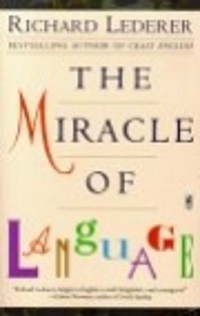Status
Publication
Description
Master verbalist Richard Lederer, America's "Wizard of Idiom" "(Denver Post), presents a love letter to the most glorious of human achievements... Welcome to Richard Lederer's beguiling celebration of language -- of our ability to utter, write, and receive words. No purists need stop here. Mr. Lederer is no linguistic sheriff organizing posses to hunt down and string up language offenders. Instead, join him "In Praise of English," and discover why the tongue described in Shakespeare's day as "of small reatch" has become the most widely spoken language in history: "English never rejects a word because of race, creed, or national origin. Did you know that" jukebox "comes from Gullah and" canoe "from Haitian Creole?" "Many of our greatest writers have invented words and bequeathed new expressions to our eveyday conversations. Can you imagine making up almost ten percent of our written vocabulary? Scholars now know that William Shakespeare did just that!" He also points out the pitfalls and pratfalls of English. If a man mans a station, what does a woman do? In the "The Department of Redundancy Department," "Is English Prejudiced?" and other essays, Richard Lederer urges us not to abandon that which makes us human: the capacity to distinguish, discriminate, compare, and evaluate.Copyright © Libri GmbH. All rights reserved.… (more)
User reviews
Lederer, a teacher of high school English and a columnist for a local newspaper, writes in an informal style. I felt that he tried to cover too much in this book since chapters seemed to move from gender problems in English to makers of new words to how to write poetry with examples from several of his high school students. Although he credited authors, he did not cite where the material was originally from. There is an index but it is not complete. The authors that he quoted in the chapter “Words about words” do not appear at all. As an academic librarian and having an interest in language, I expected more from this book.
Such potential.
